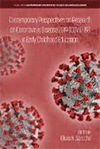
Contemporary Perspectives on Research on Coronavirus Disease 2019 (COVID-19) in Early Childhood Education
Edited by:
Olivia Saracho, University of Maryland
A volume in the series: Contemporary Perspectives in Early Childhood Education. Editor(s): Olivia Saracho, University of Maryland.
Published 2022
Coronavirus Disease 2019 (COVID-19), which is also known as SARS-CoV-2, has had a great impact in early childhood education programs. Since the effect of this epidemic was new, and little research had been conducted, this volume is devoted to understanding mutual and contemporary themes in the impact of Coronavirus Disease 2019 (COVID-19) in early childhood education. Early childhood education (ECE) centers encountered unprecedented challenges due to the COVID-19 crisis. Comprehensive reviews of the literature, descriptions of programs or situations, and research studies provided accounts of current situations in early childhood education including programs and individuals who were working with young children whose ages ranged from birth to eight years of age. The chapters in this special volume discuss how early childhood education faced unprecedented challenges due to the COVID-19 crisis and demonstrate the breadth and theoretical effectiveness of this domain. This volume provides a brief introduction that acknowledges the valuable contributions of these chapters to the impact of this pandemic in early childhood education and offers a valuable tool to practitioners and researchers who are conducting studies on the impact of COVID-19.
At the beginning of the year 2020, after a December 2019 outburst in China, the World Health Organization acknowledged SARS-CoV-2 as a different kind of coronavirus. It immediately multiplied around the world, mostly through person-to-person contact. Infections ranged from mild to deadly. COVID-19 can cause a respiratory tract infection such as ones sinuses, nose, and throat or lower respiratory tract such as ones windpipe and lungs (World Health Organization, 2020a). On January 30, 2020, the World Health Organization (WHO) affirmed that COVID-19 had become a public health emergency causing an international problem. By March 12, 2020, everybody was aware of this pandemic. It also created an understanding about this first-time consciousness in research about this disease, which generated an immense publication production. It also became the basis for this special volume.
CONTENTS
PART I: UNDERSTANDING COVID-19: CHALLENGES AND PERSPECTIVES. The Impact of Coronavirus Pandemic on Early Childhood Education, Olivia N. Saracho. History of the Coronavirus Pandemic in Early Childhood Education, Olivia N. Saracho. PART II: EARLY CHILDHOOD DEVELOPMENT AND COVID-19. Teaching Preschool During COVID-19: Insights From the Field, Susan Sonnenschein, Michele L. Stites, and Samantha H. Galczyk. Early Childhood Education and Care Beyond the Pandemic, Jitinder Walia and Jessica M. Kahn. The Pursuit of Educational Equity During the COVID-19 Pandemic: Early Lessons on Instruction, Opportunity, and Effectively Serving Young Learners, Ashlee Hover and Joshua Tipton. Australian Early Childhood Educators’ Emotional Well-Being During COVID-19 Pandemic, Gloria Quinones, Melissa Barnes, and Emily Berger. PART III: THE ROLES OF TEACHERS AND FAMILIES DURING COVID-19. Early Childhood Educators’ Experiences and Responses to COVID-19: An Impact Study Across Five Countries, Sylvia Christine Almeida, G. Kaveri, Judith Gomes, Aihua Hu, Prachi Gupta, Farhana Mannan, and Mahbub Sarkar. The Effect of COVID-19 Pandemic: Teachers and Parents Role Shift in Early Childhood Education Practices, Ade Dwi Utami and Anita Yus. Addressing Inequities: Experiences of Early Childhood Special Educators During the COVID-19 Pandemic, Jacquelyn M. Urbani and Samantha Watson-Alvarado. PART IV: TEACHER EDUCATION AND COVID-19. The Effects of the Coronavirus Disease 2019 on Early Childhood Education Preparation Programs, Tommetta Shaw. Shifts in Teaching Modalities for the Preparation of Early Childhood Preservice Teachers During COVID-19, Tuyin An and Dan Clark. Equitable Participation: Elementary Science Teacher Education During COVID-19, Aaron R. Gierhart. “You Learn From It Because You Have No Choice. And You Do It”: Teacher Candidates Adapting to Crisis, Stephanie C. Sanders-Smith, Kutasha Bryan-Silva, and Ana Aracelly Olguín. Reimagining Field Placements During the COVID-19 Pandemic: Challenges and Lessons Learned, Kristen Linzmeier, Naomi Rahn, Brooke Winchell, and Lucinda Heimer. Rebuilding Community: A University Laboratory School’s Response to an Unprecedented Crisis, Monica Miller Marsh, Tiffany Roenigk, Mustary Mariyam, and Adonia Porto. The Impact of COVID-19 on a Graduate Student-Led Literacy Camp for Children, Whitney Impellizeri, Vera J. Lee, and Katie Mathew. PART V: CONCLUSION FOR COVID-19. COVID-19: Assessing the Crisis and Envisioning the Recovery, Olivia N. Saracho. About the Contributors.
-
Paperback978-1-64802-815-1
Web price: $45.04 (Reg. 52.99)
-
Hardcover978-1-64802-816-8
Web price: $80.74 (Reg. 94.99)
- eBook978-1-64802-817-5

- EDU023000 - EDUCATION: Preschool & Kindergarten
- EDU044000 - EDUCATION: Classroom Management
- EDU029000 - EDUCATION: TEACHING METHODS & MATERIALS: General
-
 Contemporary Perspectives on Research in Assessment and Evaluation in Early Childhood Education
Contemporary Perspectives on Research in Assessment and Evaluation in Early Childhood Education
-
 Contemporary Perspectives on Research in Motivation in Early Childhood Education
Contemporary Perspectives on Research in Motivation in Early Childhood Education
-
 Contemporary Perspectives on Research on Bullying and Victimization in Early Childhood Education
Contemporary Perspectives on Research on Bullying and Victimization in Early Childhood Education
-
 Contemporary Perspectives on Research on Child Care in Early Childhood Education
Contemporary Perspectives on Research on Child Care in Early Childhood Education
-
 Contemporary Perspectives on Research on Child Development Laboratory Schools in Early Childhood Education
Contemporary Perspectives on Research on Child Development Laboratory Schools in Early Childhood Education
-
 Contemporary Perspectives on Research on Immigration in Early Childhood Education
Contemporary Perspectives on Research on Immigration in Early Childhood Education
-
 Handbook of Research Methods in Early Childhood Education - Volume 2
Review of Research Methodologies
Handbook of Research Methods in Early Childhood Education - Volume 2
Review of Research Methodologies

